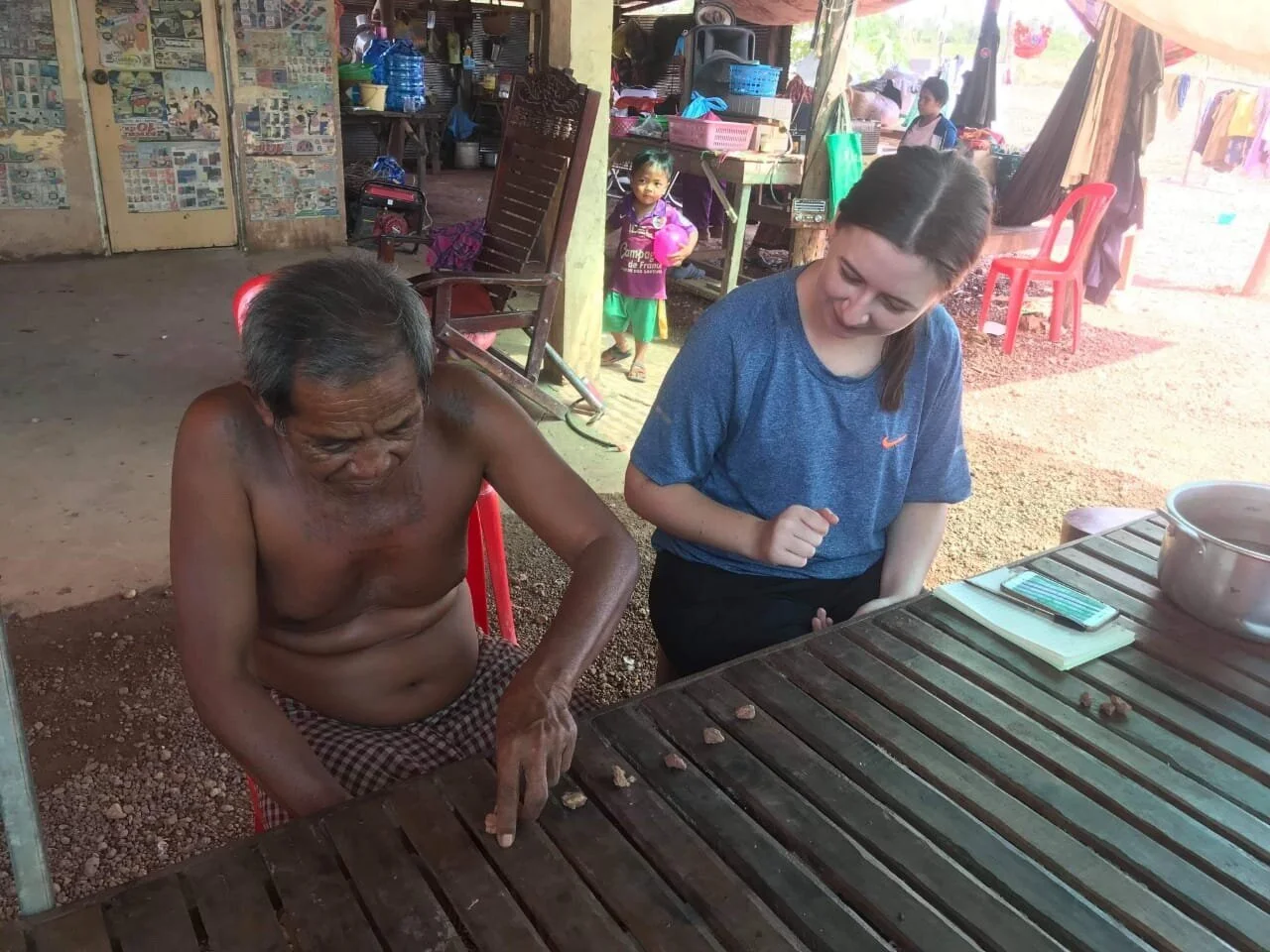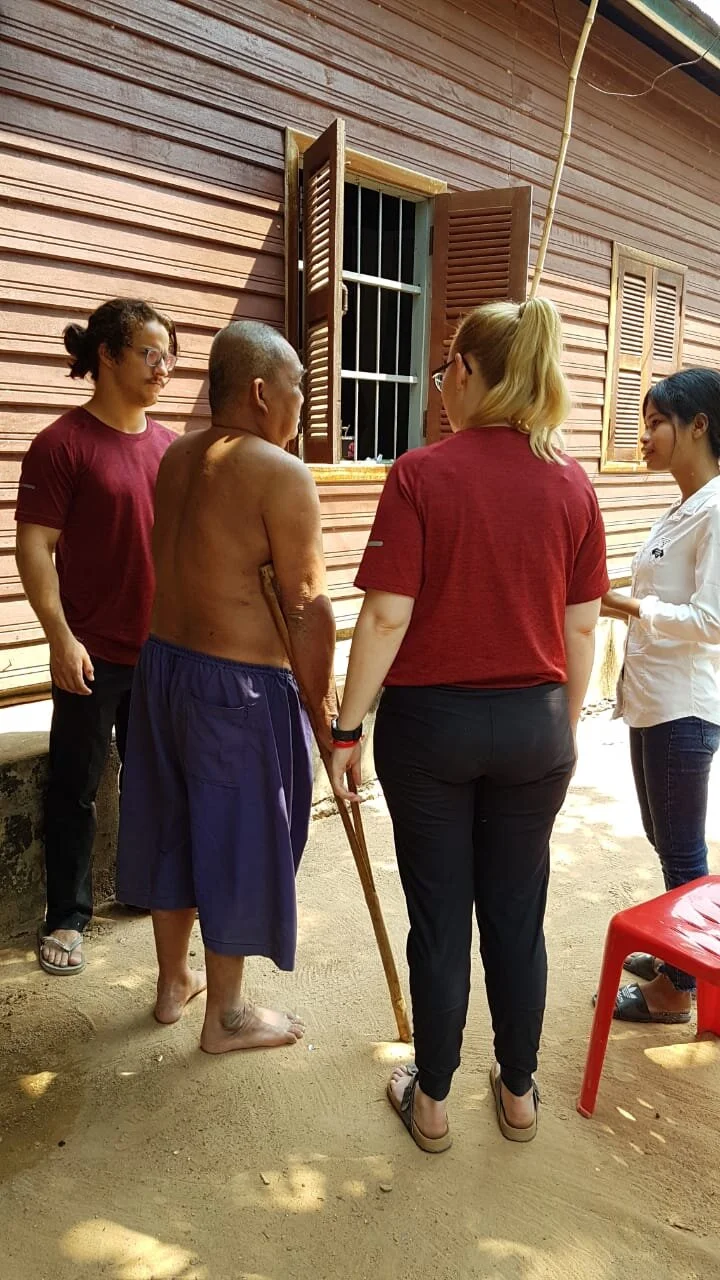
Allied Health
An international fieldwork experience develops clinical skills and important attributes needed in this globalized world such as project management, problem solving, team work and cultural competency. Working alongside local healthcare staff and in culturally diverse environments, practice skills as part of an allied health group on a community placement. Work in disability support, rehabilitation, acute, neuro or community health education learning about health care delivery in a resource poor setting whilst working to build the capacity of developing communities and local organisations. Our placements provide communities and organisations in Asia with improved access to health care, education and services and our students with practical learning experiences and an international immersion that they would unlikely gain in their undergraduate degree in Australia.
Approved University provider
Australian clinical supervision and assessment
This is a caption
About the program
As an allied health student, participate in a single discipline or interprofessional placement in Asia alongside fellow students and local health care providers. Allied Health Professions including Physiotherapy and Exercise Science, Occupational Therapy, Speech Pathology, Paramedicine, Pharmacy, Psychology, Public Health and Social Work all have a significant role to play working with projects across Asia. Most of these professions are not recognized or commonplace professions in parts of South East Asia which enhances the positive impact students can make. Student groups support allied healthcare delivery and access to services in a variety of settings. Working with local staff in rehabilitation hospitals and centres and on community outreach programs students practice clinical skills whilst gaining broader perspectives on allied health within different cultures and settings.
The program is complimented by participative health seminars, language classes and cultural orientation. Students really immerse themselves in the community and create real change in the region by conducting health education sessions in local schools and with community groups.
Learning
outcomes of this program
Developing soft skills are imperative for graduates to build their skills and enhance employability. More than 4 in 5 Australian students say their short-term international study experience has had a positive impact on their employability, according to this report published by IEAA.
Our placements are designed to place students on sites and in situations where they can meet learning outcomes and develop the following skills to add value to their degree:
- Cross Cultural Communication Skills
- Project Management
- Teamwork and Peer Learning
- Problem Solving
- Critical and Creative Thinking
- Inter-professional Learning
- Working through Interpreters
- Time Management
- Leadership, Negotiation and Conflict Resolution Skills
- Resourcefulness
Throughout our health placements, students develop and enhance specific clinical skills, including but not limited to:
- Providing Primary Health Care, working with vulnerable populations, community development, cultural safety and understanding of Social Determinants of Health
- Gaining an understanding of working with families and family assessment
- Conducting client interviews and formulating a treatment plan with a supervisor and then presenting findings
- Delivering health education across the lifespan
Destinations
Cambodia
The placement in Cambodia is an exciting opportunity to provide support and management of clients with a range of disabilities or placed in disadvantaged situations. The placement provides students with the opportunity to practice clinical skills under the supervision of Australian clinical educator/s and local staff whilst also building capacity to work as part of a team, developing skills such as project management, leadership, communication, resilience and conflict resolution. It is imperative that students participating in the Cambodia program travel aware that they will have to be adaptable and open to new ideas and be amenable to learning from others. There may also be a component of teaching required to help train local staff members.
Laos
The Laos Primary Health Placement in rural Northern Laos has a focus on community health outreach via mobile health clinics and health promotion activities, placing student groups in uniquely experiential situations that alleviate poverty, respect indigenous cultures and protect local environments whilst providing opportunities for groups to learn and practice skills in culturally diverse and challenging environments.
Nepal
The Nepal Allied Health Placement collaborates with A&B International Hospital, Fishtail Private Hospital in Pokhara, the Lions Club of Nepal and a number of non-governmental organisations and schools. The placement provides allied health students the opportunity to shadow, assist and learn from their Nepali counterparts on hospital wards, in the classroom, in community based organisations and out in the field by running community health outreach activities.
Thailand
The Thailand Community Health Placement works in conjunction with Khon Kaen University and Phu Pha Mahn District in North Eastern Thailand to provide students insight into the Thai healthcare system and clinical practice experience in a community setting. This is managed through a series of lectures, study visits, hospital department rotations, accompanying the Primary Healthcare team on home visits and school health education. Along with clinical practice the group work collaboratively on a variety of community-based experiences and development projects that place groups in uniquely experiential situations that build capacity, advocate for healthy lifestyles and protect local environments.
Vietnam
The Vietnam Primary Health Placement in Mai Chau, Northern Vietnam collaborates with remote village communes and with the central health district on a variety of community development projects to advocate for improved access to education, health and other services that many of us take for granted. The program focusses on delivering primary health outreach to disadvantaged populations through mobile clinics and health education workshops, placing student groups in uniquely experiential situations that alleviate poverty, respect indigenous cultures and protect local environments whilst providing opportunities for groups to learn and practice skills in culturally diverse and challenging environments.
Itinerary
Each itinerary we create is a bespoke experience tailored to each University’s requirements. Below is a sample of what you can expect to encounter on a Nineteen Degrees program.
01
Week 1: Arrival, Welcome & Orientation, Introduction to the Local Healthcare System, Health Related Site Visits, Language Classes & Sightseeing
02
Week 2: Hospital Rounds, Afternoon Health Seminars and Workshops, Mobile Clinics, Health Education Sessions & Daily Debriefs
03
Week 3: Continuing Mobile Clinics or Hospital placement, Health Education Sessions, Daily Debriefs before travel back to international airport
“The past three weeks have been possibly the most inspiring and life changing weeks of not only my career but also my life.”
- Georgia Hyett,
Psychology Student, Griffith University
Frequently Asked Questions
Are your programs designed with credit transfer in mind?
Yes, all our programs are designed in partnership with a University faculty or school according to their requirements and their desired learning outcomes.
Are there limits (min and max participants) to what you can do?
Minimum is 6, maximum ideally is 20 – however this is destination dependant and according to ratios of staff to students (University specific).
Why choose Cambodia?
A few weeks on placement in Cambodia will allow you to work hands-on in your chosen discipline whilst getting to grips with Cambodian culture, its people and complexities. Find out more about our Allied Health and Community Internship programs in Cambodia here.
Most Allied Health professions aren’t recognised in Cambodia, will students be working under qualified allied health professionals?
This will be dependent on the organisation you are placed in. Some health sites may have a qualified allied health professional on site who you will learn from and in some cases learn alongside. Either way you will be travelling with an Australian clinical supervisor who will oversee your assessment.
Why choose Nepal?
Nineteen Degrees work with an award-winning organisation in the beautiful city of Pokhara in the west of Nepal, a six-hour drive from the capital Kathmandu and at the foothills of the stunning Annapurna mountain range. Placement options exist for nursing and allied health students working with local partner host sites learning about healthcare delivery in this incredible country and assisting to provide health care to outlying villages.
Are student groups able to be hands-on with patients in Nepal?
Students cannot complete any invasive tasks. Until a relationship is formed all work is of an observational nature. Students will however learn from observation, seminars and workshops.
Why choose Thailand?
The Thailand community health placement for students works in conjunction with Khon Kaen University and community hospitals in North Eastern Thailand to provide students insight into the Thai healthcare system and clinical practice experience in the community setting.
Why choose Vietnam?
Nineteen Degrees collaborate with the villages on community development projects to improve access to education, health and other services. Project work places student groups in uniquely experiential situations that alleviate poverty, respect indigenous cultures and protect local environments whilst providing opportunities for groups to learn and practice skills in culturally diverse and challenging environments.





